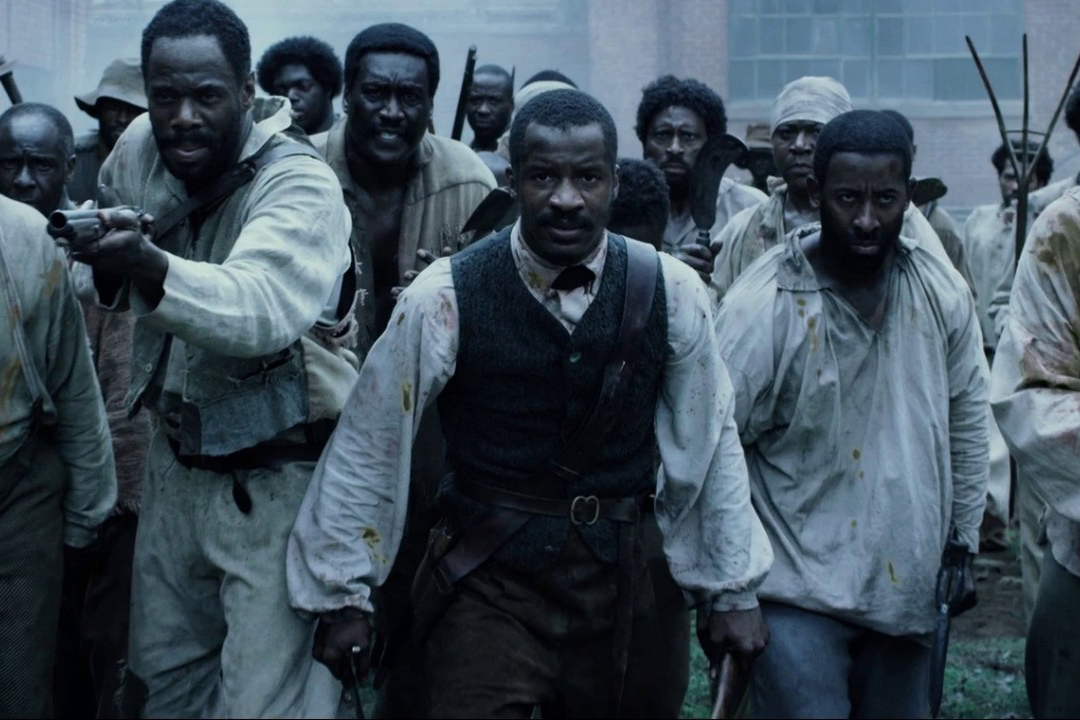The provocation begins with the title, a kind of reverse cultural appropriation: Nate Parker’s Sundance smash takes its name from a famous film released 101 years ago. Not just any film, but a cinematic titan of its era: The Birth of a Nation. D.W. Griffith’s mammoth Civil War film sold more tickets than any other movie, inspired a resurgence of the Ku Klux Klan, and caused enormous controversy as soon as it was released. The film is a synthesis of Griffith’s profound cinematic eloquence and some appallingly racist material, the latter having frequently dominated the conversation about Birth. Parker is reclaiming the title and adjusting film history. Fair enough, but if you’re going to reach that big, you’d better deliver.
The new film is based on the 1831 uprising led by Nat Turner, although much of the story here is fictional; Parker wrote the script, directed, and plays Turner. Born into slavery in Virginia, Turner is depicted as a young savant, able to read and gifted with a talent for preaching. As an adult, his owner is Samuel Turner (Armie Hammer), a relatively benign but lazy man who has squandered his family’s cotton fortune. Turner passes through various stages of radicalization, fueled partly by slavery’s bloody cruelty and partly by his Christian-flavored visions of himself as a man of destiny.
The early sequences have the cut-rate look of a TV movie, with variable performances and an awkward touch. After a while, the limited budget produces some strong effects: the repetition of certain cramped locations—like the barn interior where Turner preaches, his sermons haloed by sunbeams slanting in between the timbers—builds a rhythm that owes as much to folk song as to movie storytelling. The many scenes set by candle- or firelight, conversation hushed to avoid the ears of suspicious white people, convey the terrible reality of how enslaved human beings must hide their authentic selves.
As an actor, Parker does a powerful turn, wisely throttling Turner’s fury until the explosion comes. Colman Domingo (Fear the Walking Dead) is electric as Nat’s friend Hark, although his role feels shortened; Aja Naomi King is touching as Cherry, Nat’s wife. The standout in the cast is Roger Guenveur Smith (a veteran of Spike Lee’s movies) as the mostly silent, entirely discreet house slave, Isaiah. Smith gives us a lifetime of terror—of witnessing awful things and going along with them for the sake of survival—in precise facial expressions and pained body language. When he finally gets a big speech, in opposition to Turner’s surely suicidal plan, he shakes the walls with it.
Along with his spiritual calling, Nat Turner is especially stirred to insurgence by white men’s rape of enslaved women and by his own humiliation at preaching at Samuel Turner’s behest. Because of Nat’s talent in the pulpit, his owner tours him around to other plantations, where Nat is forced to read those Bible passages that endorse slavery. In the end, Parker struggles to connect these motivations to Turner’s ultimate historical strategy, which involved indiscriminately killing white people until slaves rebelled en masse. If this movie weren’t quite so old-school in its manipulations—if it had some of the mystery and shock of the Australian classic The Chant of Jimmie Blacksmith, for instance—Parker might have made a film of lasting power. What he gets instead is immediate blunt force. Perhaps that’s the movie 2016 needs.
The Birth of a Nation rocked Sundance in January and won two top awards there. Its profile since then has been overshadowed by revelations about Parker’s involvement in a rape case when he was in college in 1999. He was exonerated, but the story is ugly. The fact that Birth presents outrage about rape (specifically, men trying to protect women from rape) as a crucial motivating factor for key events is a strange part of the fabric that now surrounds an otherwise interesting project. Like D.W. Griffith’s landmark film, this Birth of a Nation will be remembered for unintended reasons. The Birth of a Nation, Rated R. Opens Fri., Oct. 7 in various theaters.
film@seattleweekly.com






